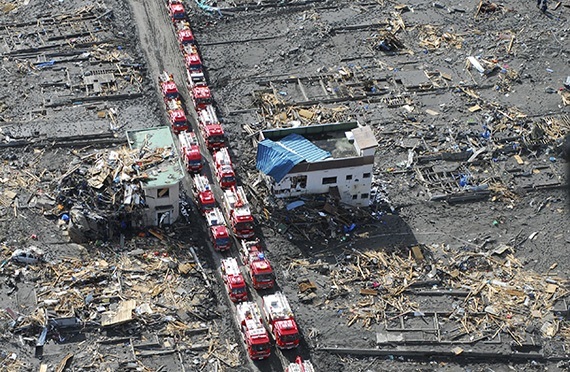This article first appeared in the From the Editor column of the Christian Research Journal, volume 28, number 01 (2005). For further information or to subscribe to the Christian Research Journal go to: http://www.equip.org/christian-research-journal/
When I first heard news of the tsunami that struck the Indian Ocean region on December 26 it stopped me in my tracks. “This could be the biggest natural disaster of our time,” I thought. On that first day the estimate death toll was “only” around 14,000, but as I write six weeks later it is approaching 300,000.
Who has not been profoundly affected by the video captures of the approaching wall of water, the apocalyptic pictures and reports of devastation and death, the seemingly capricious fates of those who were taken and those who were spared, the heart-wrenching losses suffered by natives of the region as well as visitors, and the unbelievable evil of those who have seized orphaned children to sell them into the sex slave trade? Who has not been moved by the heroism of those who did not think of their own safety in order to save (or try to save) the lives of others, and the compassionate efforts of people from around the world to help those who have been struck?
Whenever a major disaster hits, whether natural or man made, the question is raised about God’s role in it. An Internet search for the words tsunami and God yields Web pages that contain every conceivable answer to this question. For some people the disaster is an occasion for embracing or returning to faith in God; for others it is an occasion for losing faith or feeling justified in their unbelief. Comments such as the following caught my attention:
“Amid tidal waves or tsunami, earthquakes or floods, outbreaks of disease or other natural disasters, where is God?”
“Thanks for the tsunami, God! Do you realize what God just did?”
“Is the tsunami God’s judgment?”
“Tsunami: God’s Anger Revealed.”
“Tsunami = God’s wrath on non-Christians.”
“God used what unsaved Chinese people call a ‘tsunami’ to wipe out over 100,000 unbelievers in one fell swoop.”
“Did God send this tsunami because of the paganisms so prevalent in South Asia…as only a hint of the cataclysm that is yet to come—the holy judgment of God?”
“Tsunami Disaster—A judgment from God to the Islamic nations!”
“How can a merciful God allow such disaster and suffering?”
“God killed more than 150,000 people with a tsunami….This terrible tragedy only proves one simple thing: There is no God, only religious rhetoric.”
Evil and human suffering do pose a problem for faith in God. There is no reason, however, necessarily to see the occurrence of a tsunami or any other disaster that takes its toll on human life as a direct act of God. The earthquake that displaces ocean water and produced the tsunami resulted from the very structure and normal operation of God’s creation, in which geologic plates grind against each other and eventually shift to release tension. We know from observation and experience that disturbances in nature often occur, sometimes with tragic results for human beings and other forms of life.
If anyone is going to believe in God in the first places, it has to be against the backdrop of this knowledge of our perilous universe; in other words, one’s reasons for believing in God must withstand the reality of evil and human suffering. The occurrence of a particular disaster, then, should have no effect on one’s belief in God.
If one knows that God is, and what He is like, no event should cast doubt on that knowledge. Natural revelation affirms that God exists; biblical revelation confirms what God is like. The account of the fall in Genesis 3 reveals that God is not to blame for human suffering, and the Bible’s record of His acts of mercy—especially in the cross of Christ—assure us that He is a God of love. We know that this is so despite the existence of tsunamis and earthquakes, terrorists and holocausts. Scripture also assures us that a time will come for God’s people when suffering, sorrow, and death will be no more (Rev. 21:4).
I am not denying that God sometimes does use natural disaster to execute His judgment. The problem, however, is one of presumption: the canon of Scripture is closed and no one today speaks with the authority of the biblical prophets; no one can say with certainty that the tsunami or any other particular disaster is an example of God’s judgment. In God’s sovereign purpose, there can be many reasons for allowing humans to suffer, and it is not always as a punishment for their sins (consider the example of Job). If we proclaim that the tsunami is a judgment of God against pagans or Muslims, we might find ourselves having something in common with the Jews whom Jesus rebuked: “Do you think that these Galileans were worse sinners than all the other Galileans because they suffered this way? I tell you, no! But unless you repent, you too will all perish” (Luke 13:2–3 NIV). —Elliot Miller









